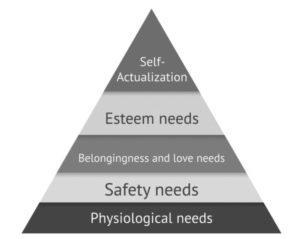Your retirement is a time when you can truly live your life in a way that is true to the values that you have. Psychiatrist Abraham Maslow called this state “self-actualization” (Maslow, 1943).
Simply put, retirement gives you the opportunity to become the person you really are, free of the pushes and pulls of daily life. That is not to say that you are immune from demands or obligations, but rather that you have framed your life goals in terms of those deeply held values that define you.
Maslow developed his “needs” pyramid as a way to describe how our needs frame our actions. Some have interpreted the pyramid as a progression through our lives. However, a better way to look at it is to understand that you may have setbacks along the way that will refocus you on lower levels of the pyramid.

For example, a financial setback may drive you all the way back to your safety needs and your preoccupation to protect what you have. Similarly, earlier in life you may have moved to the self-actualization need and had everything below looked after. Suddenly, you lose a spouse and are left with a feeling of loneliness that focuses your attention on your need for social contact.
The lowest level of the needs pyramid that is threatened will probably be your current concern. And that’s the problem with getting older—there will be many things in your life that will move you up and down Maslow’s pyramid.
The top two layers of the values pyramid represent your need for a sense of purpose and achievement. This is usually a driving force in most people’s working life, but also in your overall life, including retirement. These needs don’t go away, though many retirees feel that retiring from work also means retiring from the need to strive for something.
Values represent your deepest desires, including how you want to relate to others, to your world, to your sense of purpose. In fact, it can be argued that values are the key driver of your sense of personal accomplishment.
When you retire, that doesn’t go away. In fact, if you have decided that your retirement transition is going to be one of self-actualization, these will be the drivers of many of the important retirement achievements and goals that you have!
Next month we will look at the values the will guide your transition into retirement – what is really important, what will shape your legacy and what makes you happy.
If you’d like to check just how much you really do understand about this phase of life, take this quick quiz. You might be surprised at some of the answers!









Join the Discussion
Type out your comment here:
You must be logged in to post a comment.